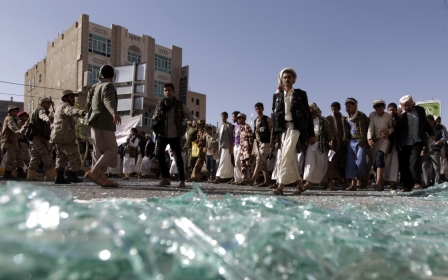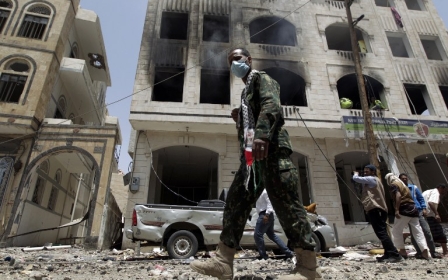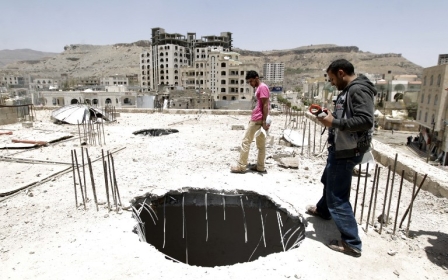Fresh Saudi-led air strikes on Houthis in Yemen

Less than 24 hours after declaring the end to its military operations, Saudi-led coalition warplanes carried out strikes on a Houthi-controlled positions in Yemen late Wednesday.
Eyewitnesses said strikes targeted the camp of the 35th Brigade in Taiz, which was controlled by Houthis earlier on Wednesday, and also hit locations in Sanaa and the central town of Yarim.
The strikes came after a Houthi spokesperson said on Wednesday that the group wants to return to UN-sponsored peace talks, but only after a complete end to air strikes.
"We call for - after the complete cessation of the brutal aggression on Yemen and the total dismantling of the blockade on its people - the resumption of political dialogue under the auspices of the United Nations," Mohammed Abdul-Salam, a Houthi spokesman, wrote on his Facebook page.
Saudi's ambassador to Washington confirmed late Wednesday that the second phase of its operation in Yemen was not a ceasefire, but a shift away from a bombing campaign "to one that will support, monitor and sustain the new political agreement."
"We have made it clear that we will not allow [the Houthis] to take Yemen by force," Adel Jubeir, the Saudi ambassador said in a press conference in Washington.
Jubeir called the Houthis"a hostile group allied with Iran and Hezbollah and said that Iran has "absolutely no role to play" in Yemen.
Although Iran and the Houthis have established diplomatic ties in recent months, the extent and nature of Iran's support for the militia has remained unclear and the country has never made a public statement about supplying Houthis with weapons.
American officials familiar with the Houthi takeover of Sanaa last year told The Huffington Post this week that Iranian representatives had discouraged the Houthis from taking the capital.
"It is wrong to think of the Houthis as a proxy force for Iran,” a US intelligence official told The Huffington Post.
Naval deterrence?
On Wednesday, two Iranian warships reached the Gulf of Aden off the coast of Yemen, a strategic waterway that connects the Persian Gulf with Egypt’s Suez Canal and is thought to carry some 3.4 million barrels of oil daily.
Iran said the ships, which reportedly left the country's Bandar Abbas port on 8 April, are on a "anti-piracy mission", according to Iran's semi-official Fars New Agency.
Earlier this week, after the Iranian navy announced the deployment of its ships, the US Navy sent an aircraft carrier on its way, guided by a missile destroyer.
"Many have asked me whether or not they are there because of the Iranian ship convoy or flotilla that is also in the area. That is certainly one of the factors," Pentagon spokesman Army Col. Steve Warren told reporters on Tuesday.
Meanwhile, Iranian Navy Commander Rear Admiral Habibollah Sayyari stressed his country's decision to maintain a presence in the Gulf of Aden, saying: "There is no need for our flotilla of warships to dock in Yemen, but we are present in the Gulf of Aden powerfully."
Strikes continue
Fractious Yemen has been in turmoil since last September, when the Houthis overran capital Sanaa, from which they have since sought to extend their influence to other parts of the country.
On 25 March, Saudi Arabia and its Arab allies including Egypt, Sudan and Jordan, began an extensive air and naval campaign against Houthi positions across Yemen.
At a press conference in Riyadh on Tuesday night, the spokesperson of Operation Decisive Storm said the campaign, which has seen some 3,200 bombs dropped on Yemen since its launch on 26 March, had destroyed all of the Houthi-controlled heavy weapons
Tuesday's announcement of Decisive Storm's end - and the beginning of what the Saudis are calling Operation Restoring Hope - came almost exactly a month after the operation abruptly began.
However, bombing continued throughout the day on Wednesday, amid reports that Houthi fighters were shelling residential areas in Aden.
Coalition aircraft reportedly dropped leaflets on the central city of Taiz on Wednesday telling residents that “the aim of the coalition forces is to support the Yemeni people against the Iranian expansion”.
New MEE newsletter: Jerusalem Dispatch
Sign up to get the latest insights and analysis on Israel-Palestine, alongside Turkey Unpacked and other MEE newsletters
Middle East Eye delivers independent and unrivalled coverage and analysis of the Middle East, North Africa and beyond. To learn more about republishing this content and the associated fees, please fill out this form. More about MEE can be found here.




